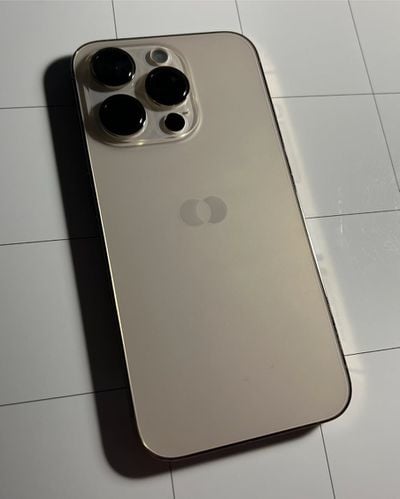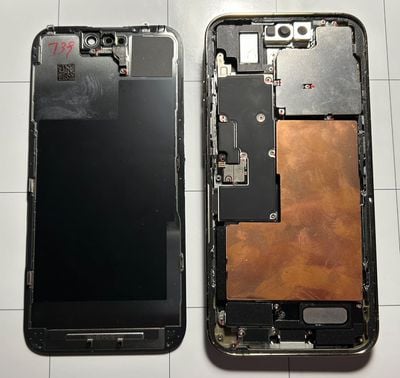Apple uses a variety of test devices and prototypes when it is considering new iPhone features, and one such test device was recently discovered by AppleDemoYT, who shared a video today. This rare prototype iPhone was originally sourced from a facility that recycles electronics.
The “Vesica Piscis” iPhone is unique because it doesn’t have an Apple logo, and it instead a symbol that looks like two crescent moon shapes. It’s a symbol that has been seen on prototype Apple devices before, specifically an early version of the AirTag. The shape that Apple is using is a mathematical shape formed when two disks with the same radius intersect, called vesica piscis in latin. It’s a symbol that has influenced everything from architecture to art.
It appears to use components from the iPhone 13 Pro and iPhone 14 Pro, though it also has parts that belong to neither of those iPhones. There are volume and power buttons that do not click when pressed. Apple is known to have worked on buttons with haptic feedback for the iPhone 15, but it’s not a feature that ever materialized.

There is a single, combined volume button rather than separate buttons, and a modified SIM tray that is shorter than normal and secured with screws. Engraving on the volume button side suggests that the device was at a “Ranger” prototype stage and was used for field testing.

Some of the internal components, such as the camera, are non-functional and appear to be placeholders, and there are a minimal number of internal cables connecting to the logic board. One cable connects to the charging port and another connects to the buttons on the device. The logic board itself has a unique layout that is a cross between the iPhone 13 Pro and iPhone 14 Pro.
When turned on, the iPhone displays a message about microcontroller initialization being completed, and when connected to a Mac, it is labeled as “Bender,” which seems to be a Futurama reference. It does not respond to input.

Based on the serial number, it appears the device was manufactured in May 2021, which predates the iPhone 13 Pro. It does not seem to be an iPhone 13 Pro prototype, though, because the iPhone 13 Pro would have already been finalized. The camera bump is similar to the iPhone 14 Pro, so it could be a 14 Pro, but the mix of components makes it difficult to identify.
AppleDemoYT speculates that it is a test device for experimental features rather than a prototype for a specific iPhone model, and it may have been designed to test haptic button technology.
Whatever it was used for, the Frankenstein iPhone provides an interesting look at some of the testing that Apple does when considering new features.


Comments are closed.